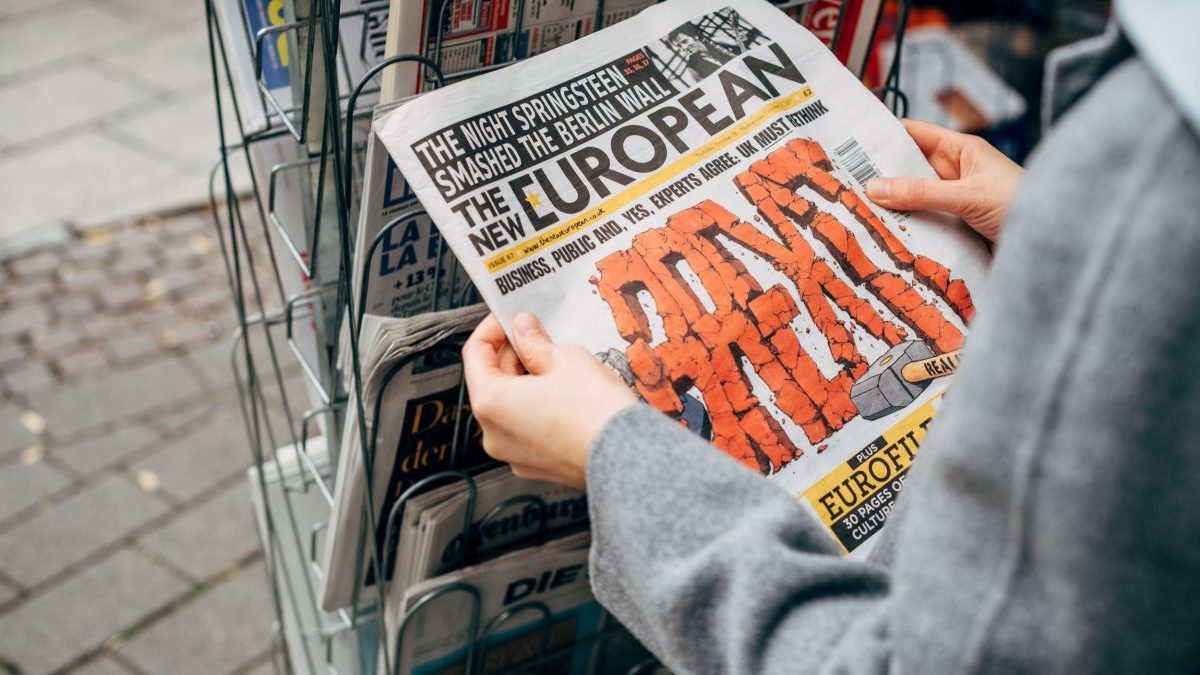For nine years The New European has railed against the 2016 vote – now it is turning to a brave New World
Founded as a voice for the 48 per cent who voted against the UK’s departure from the European Union, The New European has performed its own version of Brexit by renaming itself The New World and adopting a global strategy.
For those who identify as Remainers and dream of the day when the UK reunites with the EU, the rebranding might come as a shock. For nine years, The New European has railed against the impact of the 2016 vote. “52 per cent of us voted for Brexit… but 100 per cent of us are worse off”, read one front page.
Another depicted a tombstone epitaph: “Here lies Brexit, and lies, and lies, and lies.”
This week The New European’s readers were presented with a “Souvenir Edition” and the cover line “We’re turning the page!”, opening on to a new masthead and content with a global mission. “You can’t keep pointing back at something that happened 10 years ago,” says Matt Kelly, the founder and editor-in-chief. “It felt like the name was holding us back to the past a little bit.”
Cutting titular ties to the continent and putting the publication on a world footing promises potential commercial growth (as Brexiters once anticipated). But it also presents marketing challenges for what has been a great publishing success story.
Conceived by the regional publisher Archant as a pop-up title in the immediate aftermath to the referendum, it has become a newsstand staple. Four years ago it went independent, since when its circulation has swollen to 35,000, comparable to century-old rivals.
By going global, it risks losing the niche identity that distinguishes it in a crowded market of progressive periodicals that includes The Observer (recently relaunched under Tortoise Media), Prospect, The New Statesman, The Economist and America’s The Atlantic. One Facebook follower of The New European complained that the name change “feels like a ‘normalisation’ of Brexit”.
Brexit will remain a priority topic for The New World but not its defining theme, says Alastair Campbell, editor-at-large. “What has become clear since 2016 is that Brexit is just one part of much bigger patterns of change across much of our politics in many countries in the world.”
The former spin doctor says a repositioning to tackle the global rise of populist politics was also inspired by perceived shortcomings in the UK press. “At a time so much of the UK media is becoming more inward-looking, more nationalist, more trivial, the British public is actually looking for debate that is deeper and broader,” he says.
Kelly echoes the sentiment. “I think there is a lot of fear in newspapers and magazines these days. They are caught in a trap because so many of their readers buy into the populist narrative.”
The New European already devoted extensive coverage to Donald Trump and Vladimir Putin, whose intercontinental influence “demonstrates the fallacy of purely being a European paper”, says Kelly. When the venture capitalist Saul Klein, an investor in The New European, suggested rebranding to “The New World”, Kelly was pleasantly surprised to find the title unclaimed, since a New York weekly of that name went bust in 1845.
When The New European launched in 2016, its debut cover featured a cartoon with a man wondering “if dogs think”, while his pooch ruminated in a thought bubble on the dire consequences of Brexit and “the idiots” who voted for it. Kelly now regrets the word “idiots” and says Leavers made a flawed but “rational” choice.
On Thursday, The New World launched with a near-identical Neil Kerber cartoon, in which a dog reflects on new and “existential” dangers, and how “these clowns” (its owners) are “sitting there watching Gogglebox”. The canine wisdom is “along the same lines” but the threats of 2016 have “spread around the world”, says Kelly.
Priced at £4.95, The New World is positioned as the “cheapest magazine” on the newsstand, rather than the most expensive newspaper. Kelly anticipates “a lot of free marketing” from commentators who speak of “the new world” to describe these tumultuous times, as post-pandemic society adapts to the rise of artificial intelligence.
The New World will be “punchy and opinionated”, reflecting the former Daily Mirror executive’s “tabloid sensibility” for impactful writing. “The biggest risk for me is that we disappear up our own backsides and suddenly think we are The Economist or The Atlantic.”
Which is not to say it will be unintelligent. The New World has recruited former Observer columnist Sonia Sodha and Keir Starmer’s biographer Tom Baldwin.
It has contributing editors from West Africa to Venezuela. But it is “not trying to cover the world”, says Kelly, so much as offer “a viable progressive alternative to all this narrow-minded, petty nationalism and populism”. Let’s see if he can get it done.
